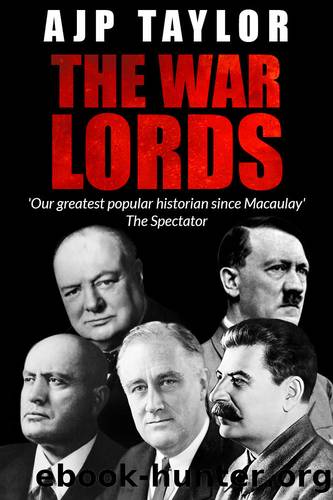The War Lords by Taylor A. J. P

Author:Taylor, A. J. P. [Taylor, A. J. P.]
Language: eng
Format: epub
Publisher: Endeavour Media
Published: 2019-03-27T21:00:00+00:00
4 - STALIN
Most people, I suppose, regard Stalin as a monster. Khrushchev said of him: 'Like Peter the Great, he fought barbarism with barbarism.' Yet, for a tyrant, he was curiously unobtrusive, almost unassertive. During the Bolshevik revolution, though he played a part, it was a modest one. Another participant, looking back, said: 'All I remember of Stalin is that he seemed like a grey blur - somebody you would hardly notice against the landscape.'
Of all the war lords I have talked about, or am going to talk about, Stalin was the only one who saw high command in the First World War or, rather, in the wars of intervention which followed it. He distinguished himself by his defence of Tsaritsyn, which as a result became known as Stalingrad. He also served in Poland. He was extremely insubordinate, taking little notice of the instructions he received from the commissar of war, Trotsky. He even took little notice of the instructions he received from Lenin, the leader of the revolution. He went his own way and stood up for himself: not conduct he would have tolerated from his own generals in the Second World War.
It was not until 1928, some ten years after the Bolshevik revolution, that Stalin manoeuvred himself into supreme power. His title remained general secretary of the Communist Party and, officially, he had no governmental position; but there can be no doubt that from 1928 he was dictator of the Soviet Union.
His rule became increasingly harsh. He arrested people by the thousand, perhaps by the million. He liquidated, as the phrase was, all his old political associates; he liquidated practically the whole high command of the Soviet army. So in 1939, when the Second World War began, Stalin stood alone, puzzled, suspicious, with nobody whom he respected, nobody whose opinions he accepted, and hardly aware of the world outside the Soviet Union. But he did have a profound anxiety: that if there were a great European war against Germany in which the Soviet Union was involved, she would have to do most of the fighting. And so it proved, for, from the time the Russians came into the war, they contended, most of the time, with four-fifths of the German army, and never with less than three-quarters. There are those who speak slightingly of Stalin making a non-aggression pact with Hitler in August 1939. But his motive was to keep his country out of war for as long as he could. Also, he misjudged: he believed that Great Britain and France would keep a western front going for a long time, thus giving the Russians time to prepare for war.
When France fell and Great Britain was then on her own, Stalin believed - indeed, it was an obsession - that Hitler would not attack the Russians until he had finished with Britain. Thus, he thought he would have enough time to prepare for the attack.
Undoubtedly, Stalin was anticipating a German attack from the time that France fell, in June 1940.
Download
This site does not store any files on its server. We only index and link to content provided by other sites. Please contact the content providers to delete copyright contents if any and email us, we'll remove relevant links or contents immediately.
| Africa | Americas |
| Arctic & Antarctica | Asia |
| Australia & Oceania | Europe |
| Middle East | Russia |
| United States | World |
| Ancient Civilizations | Military |
| Historical Study & Educational Resources |
The Light of Days by Judy Batalion(833)
Stalin's War: A New History of World War II by Sean McMeekin(693)
The Pacific War 1941-1943 by James Holland(617)
Walk in My Combat Boots by James Patterson(617)
Victory's Price (Star Wars) by Alexander Freed(587)
The Vietnam War: An Intimate History by Geoffrey C. Ward & Ken Burns(573)
First Platoon: A Story of Modern War in the Age of Identity Dominance by Annie Jacobsen(568)
The American War in Afghanistan by Carter Malkasian(561)
Cold War (Alexander King Book 2) by Bradley Wright(559)
Operation Pedestal by Max Hastings(552)
Blood and Ruins: The Great Imperial War, 1931-1945 by Richard Overy(539)
The Madman Theory by Jim Sciutto(525)
Concepts of Space by Jammer Max;(524)
Extreme Fitness by Chris McNab(519)
Flying Tiger by Samson Jack(507)
World War II Infantry Fire Support Tactics by Gordon L. Rottman(506)
Pathfinders by AL-KHALILI JIM(499)
Panzerkrieg by Mike Syron(491)
Hitler’s Pre-Emptive War: The Battle for Norway, 1940 by Henrik O. Lunde(486)
